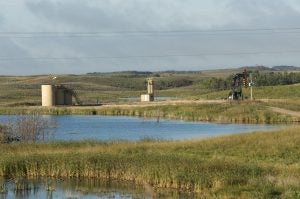 Some Texas leaders and oil and gas industry advocates have for years promoted the idea that produced water — the wastewater generated through oil and gas development — has a role to play in meeting broad water needs in our state. However, the state has a limited understanding of the chemicals in this wastewater and how programs to reuse it outside the oilfield could be practiced safely, if at all.
Some Texas leaders and oil and gas industry advocates have for years promoted the idea that produced water — the wastewater generated through oil and gas development — has a role to play in meeting broad water needs in our state. However, the state has a limited understanding of the chemicals in this wastewater and how programs to reuse it outside the oilfield could be practiced safely, if at all.
Acknowledging the necessity to better understand treatment needs, economic challenges, and public health and environmental risks of industry’s wastewater, the Texas Legislature recently passed Senate Bill 601, establishing a Texas Produced Water Consortium. The consortium will be housed at Texas Tech University, and will bring together a wide swath of agency advisors, technical experts and key stakeholders to consider these issues and produce a report with recommendations over the next year. The group is charged with suggesting legal and regulatory changes to better enable beneficial uses, identifying pilot projects and assessing the economics of using produced water both efficiently but also in a way that protects public health and the environment.
Answering these questions will be no easy feat, and Texas should definitely not encourage beneficial reuse until it can confidently answer tough questions about safety.
The unique challenge of produced water
Produced water is highly variable, highly saline and often toxic — if regulatory programs aren’t designed to directly address the unique pollutants in produced water, they will go untracked and unregulated and create potential risks to our water, land, livestock, wildlife and public health.
Texas forms new group to weigh pros, cons of repurposing oilfield wastewater Share on XThrough our research, EDF has developed a database of produced water chemicals that now totals over 1,300 constituents. Of these, less than 24% have approved analytical methods for use in a regulatory context, less than 15% have comprehensive toxicological data, and only a small fraction are covered by existing federal and state regulatory criteria and standards.
In Texas, a total of 67 chemicals commonly found in produced waters are covered by existing state surface water quality standards. Outside of surface water discharge scenarios, our state has essentially no regulatory programs designed specifically to permit the reuse of produced water in other scenarios envisioned by some as beneficial uses, such as irrigation or rangeland rehabilitation.
This consortium will have to directly grapple with these gaps and how to narrow them if reuse in any context can be shown to be beneficial and protective of public health and the environment, as charged by the statute.
While it’s positive that Texas is committing to research, it’s vital that the public and impacted stakeholders pay attention to this consortium and hold it to its charges.
Learn from New Mexico
Texas is the second state to establish a consortium, following New Mexico’s launch two years ago of a Produced Water Research Consortium. New Mexico state regulators have made a laudable commitment to get the science right before pursuing reuse or discharge alternatives outside the oilfield (Texas has yet to make such a commitment). The state is just now on the verge of conducting initial pilot tests to assess technologies and water quality outcomes, but will not release any treated waters to the environment at this stage — reducing the risk of negative impacts from this research. Texas can learn from and build on the work of New Mexico.
Prioritize health and environmental protections alongside economic proposals
A wide variety of stakeholders, including EDF, other environmental allies and a number of oil and gas companies pushed hard to ensure this bill addressed public health and environmental risk from a scientific and regulatory perspective — but it will not be fast, easy or cheap. Texans should hold the consortium to this objective and not settle for findings that promote operational and economic solutions without comprehensively addressing environmental and health risk.
Listen to impacted stakeholders outside the oil and gas industry
Oil and gas operators and treatment providers can speak to their produced water disposal needs, treatment costs and economic challenges but cannot be a voice for those who will be directly impacted by various reuse scenarios. Surface discharge and downstream uptake, food and non-food crop irrigation, livestock water, rangeland rehabilitation, aquifer recharge — each of these involves unique business, health, operational, water quality and other demands and considerations that can only be identified by those who would be directly impacted. The inclusion of these stakeholders must be imbedded in the full function and findings of the consortium and not in name only. Texans who may be impacted by these proposals — ranchers, farmers, municipal drinking water providers — need to dial in and speak up. These perspectives are vital to ensuring these practices don’t proceed without considering these communities.
Texans deserve to understand what the real risks are of reusing oil and gas wastewater in new ways that could affect our health, our livelihoods and our environment directly and what the state will do to ensure the idea of beneficial use stands up to its name.









